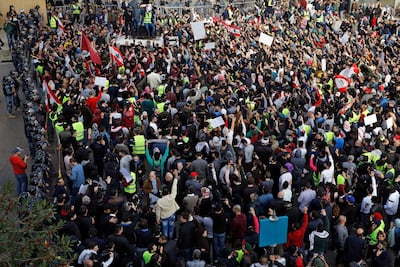Seven months have passed since Lebanese Prime-Minister-designate Saad Hariri was tasked with forming a national unity government, but officials - busy haggling over ministerial posts - have yet to agree on a cabinet lineup.
The delay, according to the speaker of Lebanon's Parliament Nabih Berri, is due to obstruction by some officials, who he says do not want a government to be formed.
Meanwhile, Lebanon's Maronite Patriarch Beshara Al Rai, said in his Christmas address that politicians were "masters in creating problems and obstacles" and did not care about financial losses suffered by the state and people.
__________________
Read more:
Lebanese security forces clash with protesters in Beirut
Moody's revises Lebanon's rating to negative on higher geopolitical risks
Lebanon's private sector growth worsens at slower rate in November
__________________
Political wrangling over cabinet formation has stalled necessary fiscal reforms that could unlock $11 billion in pledged donor loans during a Paris conference in April. Economists are warning of an economic crash that could destabilise a country that is already grappling with the world's third highest debt-to-GDP ratio.
The political and economic crisis has aggravated public discontent. Hundreds of demonstrators on Sunday took to the streets of the capital Beirut, where they called for the "overthrow" of the government, over what they described as poor governance.
Protests are expected to continue on Wednesday.
In comments published by the pro-Hezbollah Al Akhbar newspaper on Monday, Mr Berri said that "there are parties that do not want the government to be born at all."
He expressed great concern regarding "what awaits the country in the coming period".
Mr Berri did not name any specific party but said that deadlock seems to be because of issues larger than ministerial portfolios, the share of cabinet seats allotted to each party, and veto power in government.
"The matter appears to be bigger than a blocking third, portfolios, and shares," he was quoted as saying.
Separately, Lebanon's Maronite patriarch lambasted Lebanese officials for neglecting public interest.
"They do not care about the great financial losses suffered by the Lebanese state and people," he said in a televised address. "Is this not a crime?"
"This is what stirred the anger of the people yesterday. They carried out rightful protests, the dangerous consequences of which nobody can tell if the politicians continue in their manoeuvering."
Lebanese officials last week indicated a government deal is close after Lebanese President Michel Aoun agreed to cede a seat in government to one of Hezbollah's Sunni allies, satisfying a key demand by the Lebanese group.
However, on Saturday, Hezbollah's Sunni allies raised last-minute objections as to whom would represent them in government, after a candidate selected by the President, refused to exclusively represent the group.
This has started a new page of consolations over which of the remaining five MPs would represent the Sunni alliance in government.
Lebanon has been without a government since parliamentary elections were held in May.


